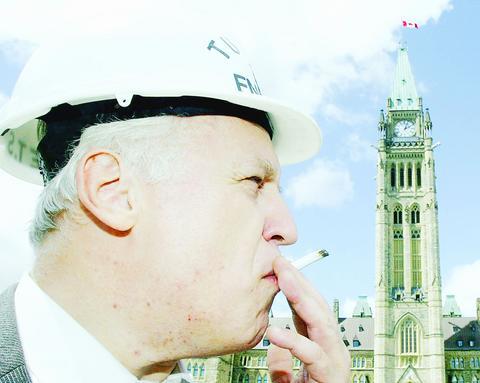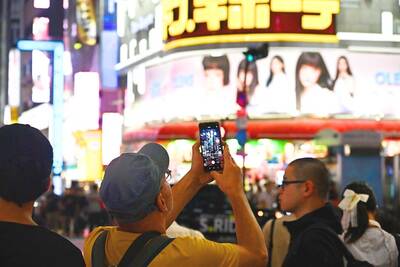The Canadian government introduced legislation on Tuesday to decriminalize possession of small amounts of marijuana but set stricter penalties for those apprehended for trafficking the drug.
After more than a years of internal debate on how to change marijuana laws, the form the legislation took was a compromise between those in the Cabinet who see the drug as a minor nuisance and those who fear that anything approaching legalization would increase use by young people.
The Bush administration has been vocal in cautioning Canada that Washington would be forced to increase time-consuming border searches if decriminalization of marijuana is enacted. US officials say decriminalization would increase supplies and trafficking.

PHOTO: AP
Canadian officials argued on Tuesday that the legislation would modernize law enforcement approaches to a drug whose use is often overlooked by the police.
"I want to be clear from the beginning, we are not legalizing marijuana and have no plans to do so," Justice Minister Martin Cauchon said. "What we are changing is the way we prosecute certain offenses of possessions. We are introducing alternative penalties."
Under the legislation, possession of up to 15g -- about 20 cigarettes -- would be an offense punishable by a fine of up to C$180 for youths and C$290 for adults.
But maximum sentences for illicit growers would increase, and the government would spend about C$150 million on an educational campaign to convince young people not to use drugs. Fines for possession would increase for intoxicated drivers.
Prime Minister Jean Chretien has publicly come out strongly for decriminalization.
Several backbench Liberal lawmakers have spoken out against the legislation, however, complaining that the legislation does not set tough minimum sentences for growers and traffickers and sends the wrong signal to youth.
"We're removing the stigma attached to the product and sanctioning or tolerating its use as produced by major elements of organized crime throughout Canada," a Liberal member of Parliament, Dan McTeague, complained in an interview. "It is by no means a done deal as far the Parliament is concerned. This bill is going to have a difficult time."

BRUSHED OFF: An ambassador to Australia previously said that Beijing does not see a reason to apologize for its naval exercises and military maneuvers in international areas China set off alarm bells in New Zealand when it dispatched powerful warships on unprecedented missions in the South Pacific without explanation, military documents showed. Beijing has spent years expanding its reach in the southern Pacific Ocean, courting island nations with new hospitals, freshly paved roads and generous offers of climate aid. However, these diplomatic efforts have increasingly been accompanied by more overt displays of military power. Three Chinese warships sailed the Tasman Sea between Australia and New Zealand in February, the first time such a task group had been sighted in those waters. “We have never seen vessels with this capability

A Japanese city would urge all smartphone users to limit screen time to two hours a day outside work or school under a proposed ordinance that includes no penalties. The limit — which would be recommended for all residents in Toyoake City — would not be binding and there would be no penalties incurred for higher usage, the draft ordinance showed. The proposal aims “to prevent excessive use of devices causing physical and mental health issues... including sleep problems,” Mayor Masafumi Koki said yesterday. The draft urges elementary-school students to avoid smartphones after 9pm, and junior-high students and older are advised not

Philippine President Ferdinand Marcos Jr has fired his national police chief, who gained attention for leading the separate arrests of former Philippine president Rodrigo Duterte on orders of the International Criminal Court and televangelist Apollo Carreon Quiboloy, who is on the FBI’s most-wanted list for alleged child sex trafficking. Philippine Executive Secretary Lucas Bersamin did not cite a reason for the removal of General Nicolas Torre as head of the 232,000-member national police force, a position he was appointed to by Marcos in May and which he would have held until 2027. He was replaced by another senior police general, Jose

POWER CONFLICT: The US president threatened to deploy National Guards in Baltimore. US media reports said he is also planning to station troops in Chicago US President Donald Trump on Sunday threatened to deploy National Guard troops to yet another Democratic stronghold, the Maryland city of Baltimore, as he seeks to expand his crackdown on crime and immigration. The Republican’s latest online rant about an “out of control, crime-ridden” city comes as Democratic state leaders — including Maryland Governor Wes Moore — line up to berate Trump on a high-profile political stage. Trump this month deployed the National Guard to the streets of Washington, in a widely criticized show of force the president said amounts to a federal takeover of US capital policing. The Guard began carrying